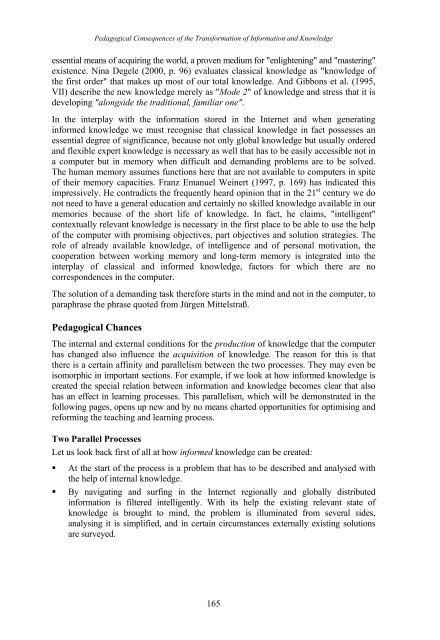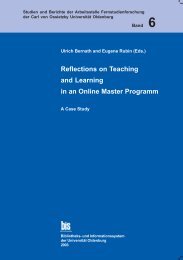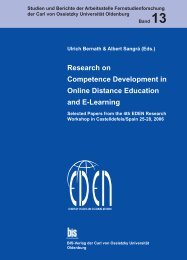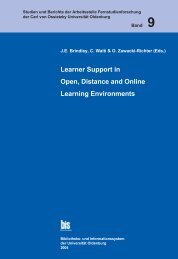Distance Education in Transition - Master of Distance Education ...
Distance Education in Transition - Master of Distance Education ...
Distance Education in Transition - Master of Distance Education ...
Create successful ePaper yourself
Turn your PDF publications into a flip-book with our unique Google optimized e-Paper software.
Pedagogical Consequences <strong>of</strong> the Transformation <strong>of</strong> Information and Knowledge<br />
essential means <strong>of</strong> acquir<strong>in</strong>g the world, a proven medium for "enlighten<strong>in</strong>g" and "master<strong>in</strong>g"<br />
existence. N<strong>in</strong>a Degele (2000, p. 96) evaluates classical knowledge as "knowledge <strong>of</strong><br />
the first order" that makes up most <strong>of</strong> our total knowledge. And Gibbons et al. (1995,<br />
VII) describe the new knowledge merely as "Mode 2" <strong>of</strong> knowledge and stress that it is<br />
develop<strong>in</strong>g "alongside the traditional, familiar one".<br />
In the <strong>in</strong>terplay with the <strong>in</strong>formation stored <strong>in</strong> the Internet and when generat<strong>in</strong>g<br />
<strong>in</strong>formed knowledge we must recognise that classical knowledge <strong>in</strong> fact possesses an<br />
essential degree <strong>of</strong> significance, because not only global knowledge but usually ordered<br />
and flexible expert knowledge is necessary as well that has to be easily accessible not <strong>in</strong><br />
a computer but <strong>in</strong> memory when difficult and demand<strong>in</strong>g problems are to be solved.<br />
The human memory assumes functions here that are not available to computers <strong>in</strong> spite<br />
<strong>of</strong> their memory capacities. Franz Emanuel We<strong>in</strong>ert (1997, p. 169) has <strong>in</strong>dicated this<br />
impressively. He contradicts the frequently heard op<strong>in</strong>ion that <strong>in</strong> the 21 st century we do<br />
not need to have a general education and certa<strong>in</strong>ly no skilled knowledge available <strong>in</strong> our<br />
memories because <strong>of</strong> the short life <strong>of</strong> knowledge. In fact, he claims, "<strong>in</strong>telligent"<br />
contextually relevant knowledge is necessary <strong>in</strong> the first place to be able to use the help<br />
<strong>of</strong> the computer with promis<strong>in</strong>g objectives, part objectives and solution strategies. The<br />
role <strong>of</strong> already available knowledge, <strong>of</strong> <strong>in</strong>telligence and <strong>of</strong> personal motivation, the<br />
cooperation between work<strong>in</strong>g memory and long-term memory is <strong>in</strong>tegrated <strong>in</strong>to the<br />
<strong>in</strong>terplay <strong>of</strong> classical and <strong>in</strong>formed knowledge, factors for which there are no<br />
correspondences <strong>in</strong> the computer.<br />
The solution <strong>of</strong> a demand<strong>in</strong>g task therefore starts <strong>in</strong> the m<strong>in</strong>d and not <strong>in</strong> the computer, to<br />
paraphrase the phrase quoted from Jürgen Mittelstraß.<br />
Pedagogical Chances<br />
The <strong>in</strong>ternal and external conditions for the production <strong>of</strong> knowledge that the computer<br />
has changed also <strong>in</strong>fluence the acquisition <strong>of</strong> knowledge. The reason for this is that<br />
there is a certa<strong>in</strong> aff<strong>in</strong>ity and parallelism between the two processes. They may even be<br />
isomorphic <strong>in</strong> important sections. For example, if we look at how <strong>in</strong>formed knowledge is<br />
created the special relation between <strong>in</strong>formation and knowledge becomes clear that also<br />
has an effect <strong>in</strong> learn<strong>in</strong>g processes. This parallelism, which will be demonstrated <strong>in</strong> the<br />
follow<strong>in</strong>g pages, opens up new and by no means charted opportunities for optimis<strong>in</strong>g and<br />
reform<strong>in</strong>g the teach<strong>in</strong>g and learn<strong>in</strong>g process.<br />
Two Parallel Processes<br />
Let us look back first <strong>of</strong> all at how <strong>in</strong>formed knowledge can be created:<br />
� At the start <strong>of</strong> the process is a problem that has to be described and analysed with<br />
the help <strong>of</strong> <strong>in</strong>ternal knowledge.<br />
� By navigat<strong>in</strong>g and surf<strong>in</strong>g <strong>in</strong> the Internet regionally and globally distributed<br />
<strong>in</strong>formation is filtered <strong>in</strong>telligently. With its help the exist<strong>in</strong>g relevant state <strong>of</strong><br />
knowledge is brought to m<strong>in</strong>d, the problem is illum<strong>in</strong>ated from several sides,<br />
analys<strong>in</strong>g it is simplified, and <strong>in</strong> certa<strong>in</strong> circumstances externally exist<strong>in</strong>g solutions<br />
are surveyed.<br />
165





